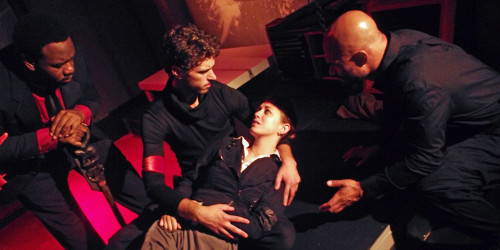By John Quinn

Art speaks to its audience; great art speaks to all audiences. But great artists have a learning curve, and "Titus Andronicus," young William Shakespeare's first tragedy, is a flawed play. Down through the centuries, playwrights and directors have attempted to re-imagine the work, revealing the core narrative while dealing with uncomfortable plot devices. Some of their results have been laughable.
John Vesbit's interpretation, "Andronicus Bound," is nothing to laugh at. As mounted by Threefold Productions, this ambitious project seeks to bring order to Shakespeare's overly complicated plot, focusing on its eponymous, tragic hero and his deteriorating family.
So what are we to make of "Titus?" Commentators speculate that Shakespeare was dabbling in "Senecan tragedy," a 16th century genre that took as its theme bloody revenge. As a whole, they're real potboilers. "Titus" is a gory bath of treachery, rape, murder, adultery and deceit. Elizabethan audiences ate it up. Oh, did I forget cannibalism?
As audience tastes refined, the play fell out of favor. In 1765, Samuel Johnson questioned the possibility of even staging the play, pointing out that "the barbarity of the spectacles, and the general massacre which are here exhibited, can scarcely be conceived tolerable to any audience."
Jump forward to 1970, when novelist Isaac Asimov commented, "Indeed, he (Shakespeare) went so far that one can almost wonder if he weren't deliberately pushing matters to the limit in order to express his disgust of the whole genre."
"Titus Andronicus" is a work of fiction, set in a Rome that never was. General Titus returns in triumph to the Eternal City after a 10-year campaign against the barbarian Goths. In his train are royal captives Tamora, Queen of the Goths, and her three adult sons. They accompany the coffin of a son of Titus, killed in battle. Bowing to the demands of his family, Titus sacrifices Tamora's eldest as a blood offering to appease the spirit of his dead son. This rash act sets powerful forces in action, as Tamora plots awful revenge against the House of Andronicus.
Just getting this scattershot plot in order, performing it in two hours and still allowing for an intermission is Vesbit's major accomplishment. Although there still appears to be too much story, that there is a logical, progressive build in the horror becomes apparent when the dross is stripped away. Although still filled with glorious gore, this new version is neither exploitative nor sensationalistic.
Three directors – Sarah Lucas, Lynch Travis and Brian Carbine – effectively manage a big cast in the tiny Mix Studio Theatre. Set designer Greg Harris provided a series of low, sprawling but unobtrusive (so audience, beware) risers; Luna Alexander's costumes, in somber blacks and browns, lend a bit of punk attitude to the design – or perhaps, given the characters, kind of goth/punk.
The antagonists, Jonathan West as Titus and Sarah Lucas as Tamora, are a strong pair that provides a dramatic center around which the atrocities revolve. Where one may get into major discussion is in the interpretation of Aaron the Moor, here played by Chris Jakob. Aaron is Tamora's secret lover. If Tamora sings of revenge, Aaron is her composer and conductor. Shakespeare's character is utterly vile; the playwright exploits his audience's xenophobia and superstitions. The text indicates that this Moor, at least, is black; Aaron is evil incarnate, the proud author and puppet master of Titus' downfall. Therein lays the dilemma: Should John Vesbit and the directors carry through Shakespeare's crude caricature, or somehow try to humanize the inhuman Aaron? Since this adaptation evokes a reality that the original lacks, it would appear that Jakob is playing a more rounded role, but is it too realistic to compliment the character's insane behavior?
One question leads to another. If "Andronicus Bound" provides a modern audience with better understanding of a flawed play, what is the relevance of "Titus Andronicus" to the 21th century? Director Julie Taymor, who headed a film version in 1999, says she was drawn to the play because she found it to be the most "relevant of Shakespeare's plays for the modern era." As she believes we live in the most violent period in history, "it seems like a play written for today, it reeks of now." This week I watched the news reports that chronicled social media turning from "flash mobs" to "bash mobs." If "Titus" reeks of now, God help us.
REVIEW:
'Andronicus Bound'
Threefold Productions at The Mix Studio Theatre, 8 N. Washington St., Ypsilanti. Friday-Sunday through July 28. 2 hours. $15-18. 734-968-8717. http://www.Threefoldproductions.org










